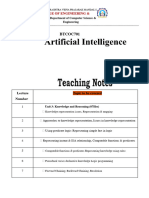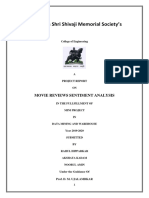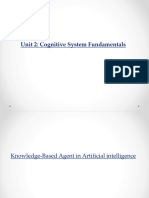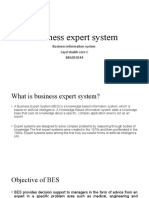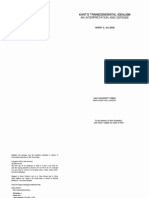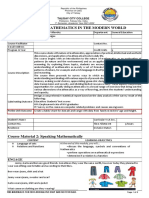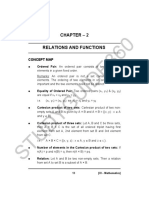100%(1)100% found this document useful (1 vote)
14 viewsAi 06
Ai 06
Uploaded by
Moayad Al KadryThe document discusses knowledge-based agents in artificial intelligence. It describes how knowledge-based agents maintain an internal state of knowledge and can reason over that knowledge to update their understanding and take actions. The key components of a knowledge-based agent are its knowledge-base, which stores facts about the world, and its inference system, which applies rules to deduce new information. There are two main approaches to building knowledge-based agents: the declarative approach, where the agent is initialized with knowledge and asks itself what to do, and the procedural approach, where desired behavior is directly encoded as a program.
Copyright:
© All Rights Reserved
Available Formats
Download as PDF, TXT or read online from Scribd
Ai 06
Ai 06
Uploaded by
Moayad Al Kadry100%(1)100% found this document useful (1 vote)
14 views15 pagesThe document discusses knowledge-based agents in artificial intelligence. It describes how knowledge-based agents maintain an internal state of knowledge and can reason over that knowledge to update their understanding and take actions. The key components of a knowledge-based agent are its knowledge-base, which stores facts about the world, and its inference system, which applies rules to deduce new information. There are two main approaches to building knowledge-based agents: the declarative approach, where the agent is initialized with knowledge and asks itself what to do, and the procedural approach, where desired behavior is directly encoded as a program.
Original Title
AI_06
Copyright
© © All Rights Reserved
Available Formats
PDF, TXT or read online from Scribd
Share this document
Did you find this document useful?
Is this content inappropriate?
The document discusses knowledge-based agents in artificial intelligence. It describes how knowledge-based agents maintain an internal state of knowledge and can reason over that knowledge to update their understanding and take actions. The key components of a knowledge-based agent are its knowledge-base, which stores facts about the world, and its inference system, which applies rules to deduce new information. There are two main approaches to building knowledge-based agents: the declarative approach, where the agent is initialized with knowledge and asks itself what to do, and the procedural approach, where desired behavior is directly encoded as a program.
Copyright:
© All Rights Reserved
Available Formats
Download as PDF, TXT or read online from Scribd
Download as pdf or txt
100%(1)100% found this document useful (1 vote)
14 views15 pagesAi 06
Ai 06
Uploaded by
Moayad Al KadryThe document discusses knowledge-based agents in artificial intelligence. It describes how knowledge-based agents maintain an internal state of knowledge and can reason over that knowledge to update their understanding and take actions. The key components of a knowledge-based agent are its knowledge-base, which stores facts about the world, and its inference system, which applies rules to deduce new information. There are two main approaches to building knowledge-based agents: the declarative approach, where the agent is initialized with knowledge and asks itself what to do, and the procedural approach, where desired behavior is directly encoded as a program.
Copyright:
© All Rights Reserved
Available Formats
Download as PDF, TXT or read online from Scribd
Download as pdf or txt
You are on page 1of 15
Artificial Intelligence
06
Dr. Eng. Yasser KHADRA
Associate Professor
16 May 2023 © Dr. Eng. Yasser KHADRA 1
Knowledge Pyramid
16 May 2023 © Dr. Eng. Yasser KHADRA 2
Types of knowledge
16 May 2023 © Dr. Eng. Yasser KHADRA 3
AI knowledge cycle
16 May 2023 © Dr. Eng. Yasser KHADRA 4
Knowledge-Based Agent in Artificial intelligence
• Intelligent agent needs knowledge about the real world for taking decisions
and reasoning to act efficiently.
• Knowledge-based agents are those agents who have the capability of
maintaining an internal state of knowledge, reason over that knowledge,
update their knowledge after observations and take actions.
16 May 2023 © Dr. Eng. Yasser KHADRA 5
The architecture of knowledge-based agent
Knowledge-base is a collection of sentences. These
sentences are expressed in a language which is called
a knowledge representation language. The
Knowledge-base of KBA stores fact about the world.
Knowledge-base is required for updating knowledge
for an agent to learn with experiences and take action
as per the knowledge.
Operations Performed by KBA
❖ TELL: Tells the knowledge base what it perceives from the environment.
❖ ASK: Asks the knowledge base what action it should perform.
❖ Perform: Performs the selected action.
16 May 2023 © Dr. Eng. Yasser KHADRA 6
The architecture of knowledge-based agent
Inference system: Inference means deriving new sentences from old. Inference
system allows us to add a new sentence to the knowledge base.
A sentence is a proposition about the world. Inference system applies logical rules
to the KB to deduce new information.
16 May 2023 © Dr. Eng. Yasser KHADRA 7
The architecture of knowledge-based agent
Inference system generates new facts so that an agent can update the KB. An
inference system works mainly in two rules which are given as:
❖ Forward chaining: It is the strategy to answer the question, “What can
happen next?”
❖ Backward chaining: is the strategy to answer the question, “Why this
happens?”
16 May 2023 © Dr. Eng. Yasser KHADRA 8
Various levels of knowledge-based agent
1) Knowledge level: The most abstract- describe agent by saying what it knows.
2) Logical level: it describes how the agent knows.
3) Implementation level: it describes how knowledge is implemented.
16 May 2023 © Dr. Eng. Yasser KHADRA 9
Approaches to designing a knowledge-based agent
There are mainly two approaches to build a knowledge-based agent:
16 May 2023 © Dr. Eng. Yasser KHADRA 10
Approaches to designing a knowledge-based agent
There are mainly two approaches to build a knowledge-based agent:
1) Declarative approach: We can create a knowledge-based agent by
initializing with an empty knowledge base and telling the agent all the
sentences with which we want to start with.
Declarative approach
Tell agent what it needs to know
Then ask itself what to do
The action has been taken
16 May 2023 © Dr. Eng. Yasser KHADRA 11
Approaches to designing a knowledge-based agent
There are mainly two approaches to build a knowledge-based agent:
1) Declarative approach: We can create a knowledge-based agent by
initializing with an empty knowledge base and telling the agent all the
sentences with which we want to start with.
2) Procedural approach: We directly encode desired behavior as a program
code. Which means we just need to write a program that already encodes the
desired behavior or agent.
However, in the real world, a successful agent can be
built by combining both declarative and procedural
approaches, and declarative knowledge can often be
compiled into more efficient procedural code.
16 May 2023 © Dr. Eng. Yasser KHADRA 12
16 May 2023 © Dr. Eng. Yasser KHADRA 13
kind of knowledge which needs to be represented in AI systems
• Object: All the facts about objects in our world domain.
• Events: Events are the actions which
occur in our world.
• Performance: It describe behavior
which involves knowledge about how to
do things.
• Meta-knowledge: It is knowledge about
what we know.
• Facts: Facts are the truths about the real
world and what we represent.
• Knowledge-Base: The central
component of the knowledge-based
agents is the knowledge base.
16 May 2023 © Dr. Eng. Yasser KHADRA 14
Techniques of knowledge representation
16 May 2023 © Dr. Eng. Yasser KHADRA 15
You might also like
- MT131 TMA 1st 2023-2024Document6 pagesMT131 TMA 1st 2023-2024kareem978No ratings yet
- Toward A Conceptual Framework For Mixed-Method Evaluation DesignsDocument20 pagesToward A Conceptual Framework For Mixed-Method Evaluation DesignsAldus Furens100% (1)
- English: Quarter 4 - Module 4Document23 pagesEnglish: Quarter 4 - Module 4Ryuk The Shinigami100% (7)
- Ai 02Document26 pagesAi 02Moayad Al KadryNo ratings yet
- PCCCS504 Module 1Document2 pagesPCCCS504 Module 1sanchayan7432No ratings yet
- Ai Unit 2Document55 pagesAi Unit 2Tushar VermaNo ratings yet
- Software Design Decoded: 66 Ways Experts ThinkFrom EverandSoftware Design Decoded: 66 Ways Experts ThinkRating: 3.5 out of 5 stars3.5/5 (5)
- (Minor Project) AMBEDKAR INSTITUTE OF TECHNOLOGYDocument42 pages(Minor Project) AMBEDKAR INSTITUTE OF TECHNOLOGYAbhishek KarnNo ratings yet
- Unit 3 Notes AIDocument45 pagesUnit 3 Notes AImr8566No ratings yet
- AI Important QuestionsDocument196 pagesAI Important QuestionsTushar GuptaNo ratings yet
- AI NotesDocument141 pagesAI NotesTushar GuptaNo ratings yet
- Ac 86Document4 pagesAc 86Adit SanurNo ratings yet
- Comparative Study of Forward and Backward Chaining in Artificial IntelligenceDocument4 pagesComparative Study of Forward and Backward Chaining in Artificial IntelligenceNICO YOGI SYAHPUTRONo ratings yet
- Ai by Abraham Ahmed 5Document8 pagesAi by Abraham Ahmed 56x49wjk6fmNo ratings yet
- AI Question BankDocument12 pagesAI Question Banksktambe371122No ratings yet
- AI Unit 3 Knowledge and ReasoningDocument31 pagesAI Unit 3 Knowledge and ReasoningVinit ManagerNo ratings yet
- Rules For Knowledge RepresentationDocument19 pagesRules For Knowledge RepresentationLissy DevasahayamNo ratings yet
- Intelligent Software Agents & Artificial Intelligence: March 2024Document18 pagesIntelligent Software Agents & Artificial Intelligence: March 2024neocien100No ratings yet
- FAIML Notes Unit 3Document65 pagesFAIML Notes Unit 3vinaymarbe40No ratings yet
- TOPA ProjectDocument20 pagesTOPA ProjectnitinNo ratings yet
- Artifical IntelligenceDocument56 pagesArtifical Intelligencenaveenkumarnaveenkumar90821No ratings yet
- Artificial Intelligence: Chapter 4 Introduction To Knowledge Base SystemsDocument20 pagesArtificial Intelligence: Chapter 4 Introduction To Knowledge Base SystemsZeeshan BhattiNo ratings yet
- Expert Systems Unit1 .Document30 pagesExpert Systems Unit1 .Mohammed LukhmanNo ratings yet
- Alok Minor ProjectDocument52 pagesAlok Minor Projectalokverma.pgdm2325bNo ratings yet
- Expert Systems - MergedDocument39 pagesExpert Systems - MergedMansi AgrawalNo ratings yet
- Knowledge Based Expert SystemsDocument14 pagesKnowledge Based Expert Systemssuhani pandey100% (1)
- DMW ReportDocument20 pagesDMW ReportRahul HipparkarNo ratings yet
- AI NotesDocument44 pagesAI NotesSushmita MhamaneNo ratings yet
- QB Previous YearDocument25 pagesQB Previous Yearnogilman001No ratings yet
- ES Unit-2Document27 pagesES Unit-2Tirth NarwalNo ratings yet
- Unit 3 Ai NotesDocument75 pagesUnit 3 Ai NotesAyushNo ratings yet
- Unit 2Document86 pagesUnit 2RomeshNo ratings yet
- Expert SystemsDocument14 pagesExpert Systemskiprutobronson12No ratings yet
- Ijsse v1 I12 937 948Document12 pagesIjsse v1 I12 937 948Srikanth SrikantiNo ratings yet
- Capstone Project ProposalDocument11 pagesCapstone Project ProposalKritagya SainNo ratings yet
- A Study of Service Expectation of The Investors From The Terminal Operators.Document46 pagesA Study of Service Expectation of The Investors From The Terminal Operators.akikhanz101284No ratings yet
- AI Lecture 1Document16 pagesAI Lecture 1amandemarvinNo ratings yet
- Introduction to Knowledge Based AgentsDocument11 pagesIntroduction to Knowledge Based Agentskhizerbaig173No ratings yet
- Ai (Unit 2)Document24 pagesAi (Unit 2)Aashish PandeyNo ratings yet
- Artificial IntelligenceDocument7 pagesArtificial IntelligenceNooB乄 VEÑOM๛No ratings yet
- AIBA MODULE 1 Expert SystemDocument8 pagesAIBA MODULE 1 Expert SystemHik HjkkNo ratings yet
- Java ProposalDocument6 pagesJava ProposalAishwarya kingeNo ratings yet
- Art If I Cal IntelligenceDocument226 pagesArt If I Cal IntelligenceAakashNo ratings yet
- Expert System Artificial IntelligenceDocument11 pagesExpert System Artificial Intelligencejyoti singhNo ratings yet
- Agent Oriented ProgramingDocument38 pagesAgent Oriented Programingapi-19937584No ratings yet
- Snsce: Unit - 5 Ai and Other Research Trends in RoboticsDocument4 pagesSnsce: Unit - 5 Ai and Other Research Trends in RoboticslvrevathiNo ratings yet
- Lexis NexisDocument5 pagesLexis Nexissharang IngawaleNo ratings yet
- Lecture 4a Knowledge RepresentationDocument39 pagesLecture 4a Knowledge RepresentationHarris ChikunyaNo ratings yet
- Edu GramDocument26 pagesEdu Gramsantosh.calibersNo ratings yet
- Teddy AIDocument7 pagesTeddy AIQuotes 'nd notesNo ratings yet
- Unit 3 - AiaDocument31 pagesUnit 3 - AiaPadmanabhan .sNo ratings yet
- Aies Unit 5Document13 pagesAies Unit 5kiruthickroshan.tmechdept107No ratings yet
- Legal ProjectDocument12 pagesLegal ProjectYash TiwariNo ratings yet
- AI - UNIT 2 - Class 7 14.12.2022Document32 pagesAI - UNIT 2 - Class 7 14.12.2022nanichilaka761No ratings yet
- Final SENDocument25 pagesFinal SENTejas DhabadkarNo ratings yet
- AIExamreviseDocument9 pagesAIExamreviseGyan Bikash MiliNo ratings yet
- Art Work: Praveeen Kumar B.SDocument33 pagesArt Work: Praveeen Kumar B.SticNo ratings yet
- Unit 5 Aies Reg 2023Document49 pagesUnit 5 Aies Reg 2023vaishnavibabu06vbNo ratings yet
- ExpertSystem 1Document12 pagesExpertSystem 1Vinay YadavNo ratings yet
- Business Expert System: Business Information System Zayd Shaikh Core C BBA019244Document9 pagesBusiness Expert System: Business Information System Zayd Shaikh Core C BBA019244Zayd ShaiKhNo ratings yet
- A Project Report On: Comparative Study ofDocument71 pagesA Project Report On: Comparative Study ofManjodh Singh BassiNo ratings yet
- The Two-Second Advantage (Review and Analysis of Ranadive and Maney's Book)From EverandThe Two-Second Advantage (Review and Analysis of Ranadive and Maney's Book)No ratings yet
- Deep Learning for Beginners: A Comprehensive Introduction of Deep Learning Fundamentals for Beginners to Understanding Frameworks, Neural Networks, Large Datasets, and Creative Applications with EaseFrom EverandDeep Learning for Beginners: A Comprehensive Introduction of Deep Learning Fundamentals for Beginners to Understanding Frameworks, Neural Networks, Large Datasets, and Creative Applications with EaseRating: 2.5 out of 5 stars2.5/5 (2)
- Ai 04Document31 pagesAi 04Moayad Al KadryNo ratings yet
- Ai 01Document29 pagesAi 01Moayad Al KadryNo ratings yet
- Balloon MythsDocument2 pagesBalloon MythsMoayad Al KadryNo ratings yet
- 15330-Article Text-54951-2-10-20211007Document10 pages15330-Article Text-54951-2-10-20211007Moayad Al KadryNo ratings yet
- Hot Air RisesanoteDocument2 pagesHot Air RisesanoteMoayad Al KadryNo ratings yet
- Lab Manual 02Document5 pagesLab Manual 02Muhammad AmirNo ratings yet
- M5 Making Judgments About A Range of TextsDocument38 pagesM5 Making Judgments About A Range of TextsVreia Zeiynt DeveraNo ratings yet
- Jones TheTheoryOfNumbers TextDocument83 pagesJones TheTheoryOfNumbers TextLivardy WufiantoNo ratings yet
- "Colorless Green Ideas Sleep Furiously": A Linguistic Test Case and Its AppropriationsDocument8 pages"Colorless Green Ideas Sleep Furiously": A Linguistic Test Case and Its AppropriationsJúlio BonattiNo ratings yet
- Probability Theory-MergedDocument127 pagesProbability Theory-MergedabhayblackbeltNo ratings yet
- Scoa Unit I MCQ: FalseDocument33 pagesScoa Unit I MCQ: FalseShruti KohakadeNo ratings yet
- Principle of Inclusion ExclusionDocument31 pagesPrinciple of Inclusion ExclusionANSHUMAAN AGARWALNo ratings yet
- Vlsi Design Lab ManualDocument14 pagesVlsi Design Lab ManualAntonio LeonNo ratings yet
- How To Write A Thesis Statement: English 2Document11 pagesHow To Write A Thesis Statement: English 2Tracy PattersonNo ratings yet
- Discrete Mathematics - Rules of InferenceDocument7 pagesDiscrete Mathematics - Rules of InferenceAldrich PanioNo ratings yet
- C. Coseru - Hermeneutics in A Buddhist Perspective (Origini 1-2002)Document5 pagesC. Coseru - Hermeneutics in A Buddhist Perspective (Origini 1-2002)originicsNo ratings yet
- Course: KS091201 Matematika Diskrit (Discrete Mathematics)Document17 pagesCourse: KS091201 Matematika Diskrit (Discrete Mathematics)Saida AdillaNo ratings yet
- Turing MachinesDocument16 pagesTuring MachinesSaima NazNo ratings yet
- Inclusion/Exclusion PrincipleDocument6 pagesInclusion/Exclusion Principlekeelia1saNo ratings yet
- DBMS Relational Algebra - JavatpointDocument6 pagesDBMS Relational Algebra - Javatpointriddhi chavanNo ratings yet
- Discrete MathematicsDocument3 pagesDiscrete MathematicsDalilah FarhanaNo ratings yet
- Aristotle and SubstanceDocument4 pagesAristotle and SubstanceJosé Marìa LlovetNo ratings yet
- Allison, Henry - Kant's Transcendental IdealismDocument199 pagesAllison, Henry - Kant's Transcendental IdealismHuei Chang100% (1)
- Rapaport W. Philosophy of Computer Science. An Introduction... 2023Document1,225 pagesRapaport W. Philosophy of Computer Science. An Introduction... 2023ert9875321100% (3)
- Informal FallaciesDocument7 pagesInformal FallaciesbeepNo ratings yet
- RevisedCM2 GEmath4Document9 pagesRevisedCM2 GEmath4Jhenny MTNo ratings yet
- 100 Problem Set 4Document9 pages100 Problem Set 4UbaidaNo ratings yet
- Proving - m9 P 424Document10 pagesProving - m9 P 424api-279213523No ratings yet
- Nelson Goodman & The New Riddle of InductionDocument3 pagesNelson Goodman & The New Riddle of InductiontaufiqstuneNo ratings yet
- Class 11 Maths Notes Chapter 2 Studyguide360 PDFDocument16 pagesClass 11 Maths Notes Chapter 2 Studyguide360 PDFPranavNo ratings yet
- Sorgner - Metaphysics Without Truth On The Importance of Consistency Within Nietzsche's Philosophy - Marquette University PDFDocument174 pagesSorgner - Metaphysics Without Truth On The Importance of Consistency Within Nietzsche's Philosophy - Marquette University PDFrenatamattNo ratings yet
- A Detailed Lesson PlanDocument7 pagesA Detailed Lesson PlanAngelo NelmidaNo ratings yet















